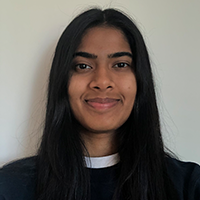
Gurleen worked with Dr. Alannah Hallas to investigate the structural stability in LiNiO2 and whether variations in the crystal structure at very small length scales could explain some of the observed properties in these materials.
What was a highlight(s) of your summer research experience?
A highlight of my summer research experience is that I got to have a part in guiding the direction of my research project. My supervisors were very supportive and allowed me to pursue ideas that I had thought of, which was exciting!
What was the most challenging part of your research?
The most challenging part of the research was understanding the theory/physics behind the instrumentation we use to measure our samples. It’s quite straightforward to measure what you need to measure, but to understand what is happening inside the machine is a bit of a learning gap. It feels great once you finally understand what is going on!
What are some surprising facts about your research field and/or project?
One surprising fact about my summer project is the amount of chemistry knowledge I needed! To make the LiNiO2 crystal I would use chemistry, but then to study it I would use physics, which I think is a neat mix!
How do you think this experience will help you in your developing career?
This experience completely motivated me to pursue graduate studies in this field. I was already thinking of doing this, but I did not really know what to expect from a lab environment. This experience was very insightful and helped me realize that I love experimental physics and would like to study various kinds of materials in graduate studies.
What did you gain from this experience (i.e., what skills? What knowledge?)
From this experience I gained a working knowledge about the lab environment and a lot about how to apply what I learned in class. It’s very fascinating when you come across concepts you are so familiar with in class and then being able to apply them in various ways in the lab.
What did you learn about working in a team?
I learned that the ‘team’ environment in academia is very important. The upper year students have an abundance of knowledge that can only be learned through experience, and having them guide you while they share what they have learned throughout their careers is invaluable to an undergraduate student.
What are some new insights you have about academic research and/or science education and/or industry?
A new insight that I have about the above fields is that they are all very connected. It is very possible to work within the industry while staying in academia, or you can solely pursue academia, or you can even gain a strong industry position if you decide to leave graduate studies. This just depends on your goal, but it is definitely possible to change fields. You are not just stuck to one path once you choose it.
Has your experience changed your ideas of what your future career may be?
Yes, I would like to stay in academia but if I had the chance, I would love to work in an industry position and see what that is like as well. This experience has solidified what I had already been planning for the direction of my future career, which is quite relieving!
Name your favorite Physics tech (machine, system, lab, etc.)
My favourite physics tech for this summer must be the PPMS (Physical Property Measurement System).
What tips would you offer students who are interested in UBC USRA (NSERC, SURE, Work Learn) research experience?
One tip which was the key for getting me this position was having initiative. If I had not taken the initiative to send Dr. Hallas an email saying I loved her presentation (she was presenting at McMaster University) and would be interested in working in her lab, I would not be here. It is important to be a little bit outgoing and make sure you communicate what your interests are, since no one will know unless you tell them!